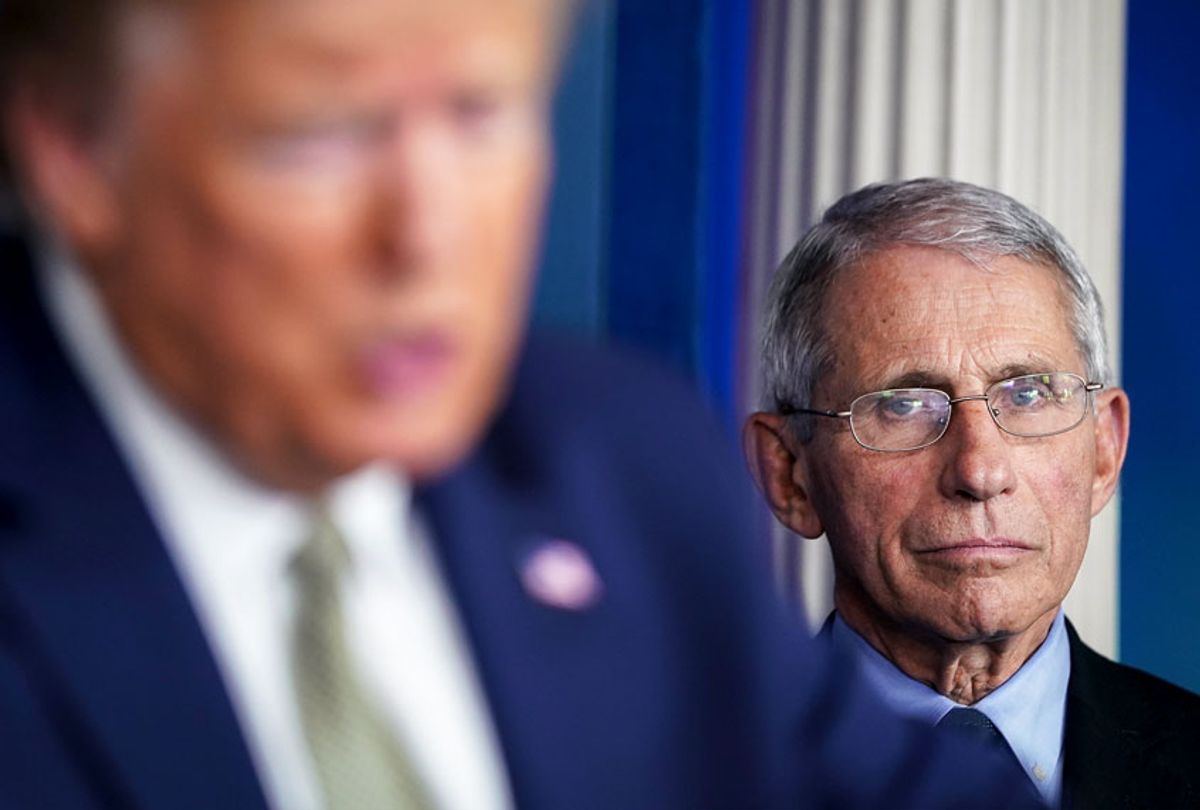Dr. Anthony Fauci, the top infectious disease expert in the country, expressed frustration at President Donald Trump for making inaccurate and false statements at White House press briefings while conceding that there was little he could do publicly.
Fauci, the director of the National Institute of Allergy and Infectious Diseases, told Science magazine that he feels "exhausted" and acknowledged tension in his relationship with Trump.
"To my knowledge, I haven't been fired," he joked.
Fauci said that Trump and he disagree "on some things," but "on substantive issues, he does listen to what I say."
Trump and Fauci most recently split on the experimental use of a malaria drug to treat severe coronavirus cases during a news briefing, with Trump expressing optimism and Fauci downplaying the chances of it working.
Fauci told Science magazine that he doesn't "disagree on the substance" of Trump's briefings but acknowledged the president's remarks could be misleading.
"I don't disagree in the substance. It is expressed in a way that I would not express it, because it could lead to some misunderstanding about what the facts are about a given subject," he explained.
Fauci also acknowledged that Trump flouted federal guidance at his news conferences by shaking hands with a large number of people.
"We should not be doing that. Not only that — we should be physically separating a bit more on those press conferences," Fauci said. "To his credit, the vice president is really pushing for physical separation of the task force . . . so he's definitely adhering to that. The situation on stage [for the press briefings] is a bit more problematic. I keep saying, 'Is there any way we can get a virtual press conference?' Thus far, no."
"When you're dealing with the White House, sometimes you have to say things one, two, three, four times and then it happens," he added. "So, I'm going to keep pushing."
Reporter Jon Cohen pressed Fauci on Trump's false claims that don't "comport with facts."
"I know, but what do you want me to do?" Fauci replied. "I mean, seriously Jon. Let's get real. What do you want me to do?"
"Most everyone thinks that you're doing a remarkable job, but you're standing there as the representative of truth and facts," Cohen said. "But things are being said that aren't true and aren't factual."
Fauci said that he expresses his concerns in private.
"The next time they sit down with him and talk about what he's going to say, they will say, 'By the way, Mr. President, be careful about this and don't say that,'" he said. "But I can't jump in front of the microphone and push him down. OK, he said it. Let's try and get it corrected for the next time."
Fauci also said he would never call COVID-19 the "Chinese virus," the racist and xenophobic term repeatedly used by the president, and dodged a question about whether he was "criticized" for face-palming during a recent briefing at which Trump referred to the State Department as the "Deep State Department."
Fauci admitted that his strategy has been "risky" in an interview with The New York Times.
"That's kind of funny but understandable that people said, 'What the hell's the matter with Fauci?' Because I had been walking a fine line. I've been telling the president things he doesn't want to hear. I have publicly had to say something different with what he states," he said. "It's a risky business, but that's my style . . . I say it the way it is, and if he's going to get pissed off, he's going to get pissed off. Thankfully, he is not. Interestingly."
Fauci said he does not contradict Trump at news briefings, because "I don't want to embarrass him."
"I don't want to act like a tough guy, like I stood up to the president," he added. "I just want to get the facts out. And instead of saying, 'You're wrong,' all you need to do is continually talk about what the data are and what the evidence is."
Fauci compared his frank discussions with Trump to his discussions with former President Ronald Reagan during the AIDS crisis in the 1980s in another interview with The Atlantic.
"I was, like, the lone wolf out there: 'This is going to be big. We've got to do something about it,'" he said. "I'm doing the same thing now. And my attitude is: I'm going to keep doing that. I don't think they're going to try to silence me. I think that would be foolish on their part, and I don't even think they want to. I think, in some respects, they welcome my voice out there telling the truth. I'm going to keep doing it. And no matter what happens to me, I'm going to keep doing it."



Shares